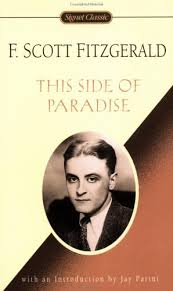 This Side of Paradise was published on this day in 1920, immediately launching 23-year-old F. Scott Fitzgerald to fame and fortune. It is a work of a young author, and possesses some fundamental flaws, both structural and thematic. But it is a truly important work, both in the life of its author, F. Scott Fitzgerald, and for the course of twentieth-century American history and fiction. The novel contains a number of autobiographical elements and made an enormous impact on the later life of its author–who may never have written anything else if not for its success. The book was successful not only because of Fitzgerald’s lyrical and graceful writing, but more importantly as a telling portrait of a new era in American history.
This Side of Paradise was published on this day in 1920, immediately launching 23-year-old F. Scott Fitzgerald to fame and fortune. It is a work of a young author, and possesses some fundamental flaws, both structural and thematic. But it is a truly important work, both in the life of its author, F. Scott Fitzgerald, and for the course of twentieth-century American history and fiction. The novel contains a number of autobiographical elements and made an enormous impact on the later life of its author–who may never have written anything else if not for its success. The book was successful not only because of Fitzgerald’s lyrical and graceful writing, but more importantly as a telling portrait of a new era in American history.
A great deal of the material Fitzgerald employed to write This Side of Paradise came from his own experiences up to that time. The main character, Amory Blaine, is, in many ways, a thinly veiled Fitzgerald. This semi-autobiographical literary technique is one that Fitzgerald employed often throughout his career, and for which he often met strong criticism. However, in the particular case of This Side of Paradise, the most commercially successful of the author’s novels, the technique met with popular acclaim.
 Fitzgerald managed to capture a period of American history and a portrait of the new youth culture (which involved drinking and casual kissing) in a way that few, if any, authors at the time were able. Though in many ways a product and an embodiment of his times, Fitzgerald was able to see through the glamour of the lifestyle to make incisive commentaries on its moral vacuity.
Fitzgerald managed to capture a period of American history and a portrait of the new youth culture (which involved drinking and casual kissing) in a way that few, if any, authors at the time were able. Though in many ways a product and an embodiment of his times, Fitzgerald was able to see through the glamour of the lifestyle to make incisive commentaries on its moral vacuity.
“I suppose all great happiness is a little sad. Beauty means the scent of roses and then the death of roses—”
— F. Scott Fitzgerald, This Side of Paradise


I was recently reading about Fitzgerald, although I can’t remember the reason that I looked him up. His end was quite tragic. It seems he was very much the embodiment of his times.
LikeLike
Was the something to do with The Great Gatsby?
LikeLike
I really can’t remember why I looked him up. But it was him and Ernest Hemingway. Hmmmm, actually, I think I looked up Zelda Fitzgerald first. My father had a cousin who was named after her. She later changed her name to Debbie. Can’t say I blame her!
LikeLike
Fitzgerald is probably my favorite novelist of the 20th century and I love the quote you picked at the end. What didn’t you like about the structure?
LikeLike
In this his first book there were some problems that as he went on to write other books were solved simply through expierence and comfort with his craft. This while quite brilliant was a little clumsy in places and you can see where he was getting the feel for his own style – semi autobiographical. This just led to clumsy links when trying to preserve the underlying them while still telling a story. As I said merely inexperience and experimenting with a writing style that was new to that ere. He grew into it quickly and even by the end of This Side of Paradise you can sense some of the confidence and fluidity that wasn’t as obvious in the first part of this story.
LikeLike
Good points. I’ll have to find my copy because I vaguely remember the introduction speaking to this entire subject and it entered my head reading your post. I’ll try to find it because it might be interesting. Good post.
LikeLike
The movie, The Curious case of Benjamin Button was based on one of his books, right?
LikeLike
yes and The Great Gatsby
LikeLike
Fitzgerald was such a good writer. I love his work
LikeLike
Yes he’s one of my favorites from that era.
LikeLike
I certainly agree that great joy is defined by its sadness. The only time you see the base of the mountain is when you’ve attained its heights.
LikeLike